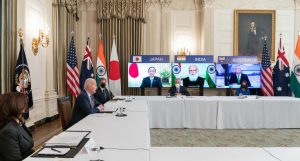By Mohamed Zeeshan

The secret to success seems to have been steering clear of sensitive security issues, finding common cause on a shared interest and investing in India’s capabilities. Among other things, the leaders pledged to boost India’s vaccine manufacturing capacity in the face of COVID-19. As reported, India will be manufacturing up to a billion single-dose Johnson & Johnson vaccines, with the U.S and Japan providing financial support and Australia taking care of logistics.
Even as the threat from China was left unspoken by the Quad, Beijing was clearly a factor in driving this plan. The Quad hopes that India’s vaccine machine will help counter China’s vaccine supply and influence, especially in South and Southeast Asia. According to some estimates, China has sent as much as 62 percent of its global vaccine supply to Southeast Asia. Laos, Myanmar, the Philippines, Cambodia and Brunei are reported to have received over 2 million doses as donations. Boosting India’s vaccine production could help sway that region away from Beijing’s stranglehold.
If the Quad sees this as a template for its long-term engagement, India would gain immensely. New Delhi should, in fact, push the Quad to invest more in the years ahead to build its own domestic capabilities. Owing to the fact that the rest of the Quad are all far more economically advanced, the range of topics to work on is limitless – from modernizing Indian agriculture to developing defense technology; from building clean energy solutions for India’s ever-growing needs to improving the quality of India’s education sector.
India already conducts some bilateral programs with the U.S., Japan and Australia in this spirit, including collaborations on defense with the U.S., common infrastructure projects alongside Japan, and even support on agriculture development from Australia. But a focused multilateral effort would go so much further in helping India grow, by pooling in resources from the rest of the Quad on various areas of interest. This is precisely what the COVID-19 vaccine initiative shows.
The challenge for India, though, is in giving its Quad partners an incentive to engage in such sustained investment for India’s personal benefit for the years ahead. And this is where – despite cautious rhetoric for a while – New Delhi cannot escape the China factor. China is clearly the Quad’s long-term threat and interest, and several factors make India the most suitable country to represent the effort to counterbalance Beijing, front and center.
India is most suitably located, at the confluence of Southeast Asia and the Indian Ocean, with its maritime presence steadily spreading as far as East Africa. It also enjoys promising demographics, which will make it consequential to the global economy in the decades ahead and the only potential contender to China’s economic might in the developing world. A more powerful India will be able to counter Chinese influence across the Indo-Pacific, Africa and beyond – thereby giving the Quad a significant incentive to invest in India’s national power and foreign policy reach.
Yet, on the other hand, the longer the Quad avoids discussions on sensitive security issues or the threat from China, the weaker would be its incentive to empower New Delhi’s domestic capabilities. India’s deference to a more multi-aligned or non-aligned approach – balancing its participation in competing alliances, such as the Shanghai Cooperation Organization (SCO) with China and Russia – makes its long-term strategic direction questionable.
Some sections of Indian strategic thinking hang on to such an approach on geopolitical flashpoints around the world because they hope that this would help New Delhi secure developmental support from a broader diversity of partners. But support for development is increasingly driven by geopolitical considerations – and New Delhi cannot escape that, especially in the Indo-Pacific.
If New Delhi wants to turn the Quad into long-term investors in its own emergence as a regional and global power, it would have to respond to the geopolitical interests of its Quad partners far more enthusiastically.
No comments:
Post a Comment